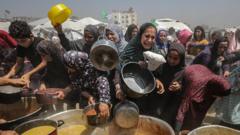The Integrated Food Security Phase Classification report indicates that 2.1 million residents face extreme food insecurity, urging immediate international action.
**Gaza Faces Escalating Humanitarian Crisis Amid Blockade, UN Warns**

**Gaza Faces Escalating Humanitarian Crisis Amid Blockade, UN Warns**
A new UN assessment highlights dire food security risks for Gaza's population under the ongoing blockade.
Despite a brief ceasefire, the humanitarian landscape in Gaza has rapidly deteriorated, leading to alarming levels of food insecurity. The Integrated Food Security Phase Classification (IPC), a UN-backed initiative, has released a report indicating that the population of approximately 2.1 million Palestinians is now at a "critical risk" of famine. The blockade imposed by Israel has exacerbated the situation, following a temporary reprieve during a two-month ceasefire that ended recently.
The IPC's assessment reported a sharp decline in food security since October 2024, although it stated that famine has not been officially declared at this time. The current humanitarian crisis has seen about 244,000 people experiencing “catastrophic” levels of food insecurity, while half a million residents are on the brink of starvation. The assessment highlights that nearly 71,000 children under five are projected to suffer from acute malnutrition in the coming months.
International responses have condemned the ongoing blockade, with aid agencies warning that it may amount to a war crime and a policy of starvation against the civilian population. The Israeli government has rebutted claims of a hunger crisis, citing aid delivered during the ceasefire, yet the IPC reveals that 93% of Gaza's population is living under conditions of high acute food insecurity.
Meanwhile, plans for an expanded Israeli military campaign have been set in motion, coinciding with forthcoming diplomatic efforts involving US President Donald Trump, who is expected to arrive in the Middle East soon. Israel has reiterated its commitment to military operations against Hamas, potentially leading to further displacement of Palestinian families and tighter restrictions on humanitarian aid distribution.
The IPC has cautioned that the proposed aid distribution efforts by Israel are deemed "highly insufficient" and have raised concerns about the accessibility of aid for the affected population. As conditions worsen, households have resorted to desperate measures for food, including recycling waste materials for sale.
This bleak situation follows a series of violent escalations triggered by Hamas's attacks on southern Israel, resulting in widespread destruction and loss of life. The death toll in Gaza has skyrocketed, as the ongoing conflict intensifies the suffering of civilians facing unprecedented humanitarian challenges.
The IPC's assessment reported a sharp decline in food security since October 2024, although it stated that famine has not been officially declared at this time. The current humanitarian crisis has seen about 244,000 people experiencing “catastrophic” levels of food insecurity, while half a million residents are on the brink of starvation. The assessment highlights that nearly 71,000 children under five are projected to suffer from acute malnutrition in the coming months.
International responses have condemned the ongoing blockade, with aid agencies warning that it may amount to a war crime and a policy of starvation against the civilian population. The Israeli government has rebutted claims of a hunger crisis, citing aid delivered during the ceasefire, yet the IPC reveals that 93% of Gaza's population is living under conditions of high acute food insecurity.
Meanwhile, plans for an expanded Israeli military campaign have been set in motion, coinciding with forthcoming diplomatic efforts involving US President Donald Trump, who is expected to arrive in the Middle East soon. Israel has reiterated its commitment to military operations against Hamas, potentially leading to further displacement of Palestinian families and tighter restrictions on humanitarian aid distribution.
The IPC has cautioned that the proposed aid distribution efforts by Israel are deemed "highly insufficient" and have raised concerns about the accessibility of aid for the affected population. As conditions worsen, households have resorted to desperate measures for food, including recycling waste materials for sale.
This bleak situation follows a series of violent escalations triggered by Hamas's attacks on southern Israel, resulting in widespread destruction and loss of life. The death toll in Gaza has skyrocketed, as the ongoing conflict intensifies the suffering of civilians facing unprecedented humanitarian challenges.





















